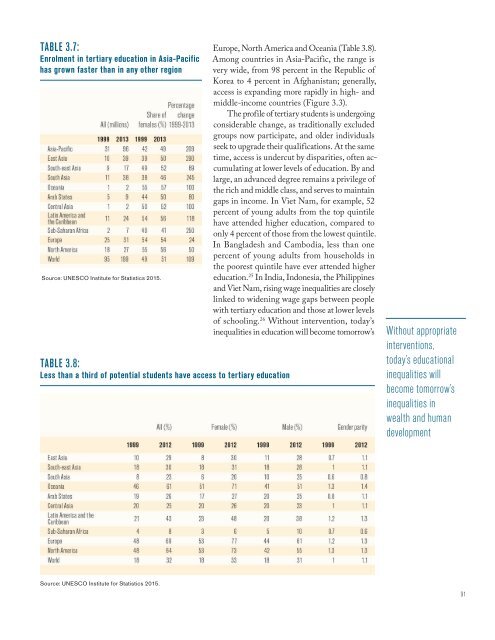SHAPING THE FUTURE HOW CHANGING DEMOGRAPHICS CAN POWER HUMAN DEVELOPMENT
1VPo4Vw
1VPo4Vw
Create successful ePaper yourself
Turn your PDF publications into a flip-book with our unique Google optimized e-Paper software.
TABLE 3.7:<br />
Enrolment in tertiary education in Asia-Pacific<br />
has grown faster than in any other region<br />
Source: UNESCO Institute for Statistics 2015.<br />
TABLE 3.8:<br />
Less than a third of potential students have access to tertiary education<br />
Europe, North America and Oceania (Table 3.8).<br />
Among countries in Asia-Pacific, the range is<br />
very wide, from 98 percent in the Republic of<br />
Korea to 4 percent in Afghanistan; generally,<br />
access is expanding more rapidly in high- and<br />
middle-income countries (Figure 3.3).<br />
The profile of tertiary students is undergoing<br />
considerable change, as traditionally excluded<br />
groups now participate, and older individuals<br />
seek to upgrade their qualifications. At the same<br />
time, access is undercut by disparities, often accumulating<br />
at lower levels of education. By and<br />
large, an advanced degree remains a privilege of<br />
the rich and middle class, and serves to maintain<br />
gaps in income. In Viet Nam, for example, 52<br />
percent of young adults from the top quintile<br />
have attended higher education, compared to<br />
only 4 percent of those from the lowest quintile.<br />
In Bangladesh and Cambodia, less than one<br />
percent of young adults from households in<br />
the poorest quintile have ever attended higher<br />
education. 25 In India, Indonesia, the Philippines<br />
and Viet Nam, rising wage inequalities are closely<br />
linked to widening wage gaps between people<br />
with tertiary education and those at lower levels<br />
of schooling. 26 Without intervention, today’s<br />
inequalities in education will become tomorrow’s<br />
Without appropriate<br />
interventions,<br />
today’s educational<br />
inequalities will<br />
become tomorrow’s<br />
inequalities in<br />
wealth and human<br />
development<br />
Source: UNESCO Institute for Statistics 2015.<br />
91


